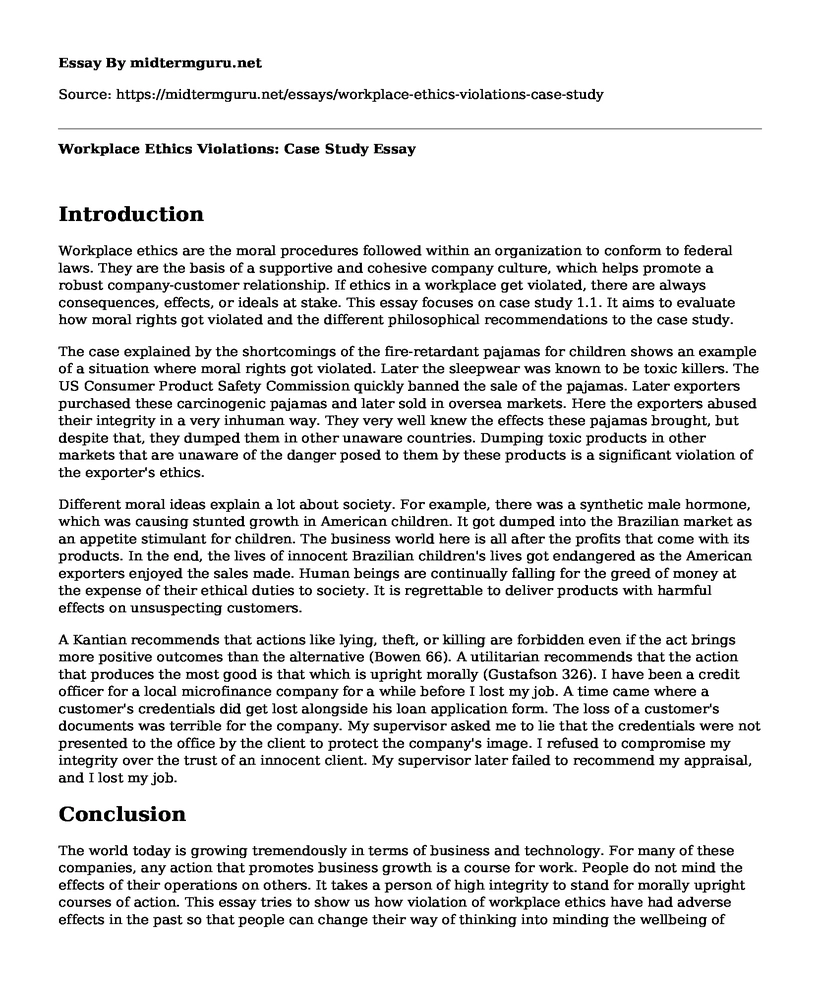Introduction
Workplace ethics are the moral procedures followed within an organization to conform to federal laws. They are the basis of a supportive and cohesive company culture, which helps promote a robust company-customer relationship. If ethics in a workplace get violated, there are always consequences, effects, or ideals at stake. This essay focuses on case study 1.1. It aims to evaluate how moral rights got violated and the different philosophical recommendations to the case study.
The case explained by the shortcomings of the fire-retardant pajamas for children shows an example of a situation where moral rights got violated. Later the sleepwear was known to be toxic killers. The US Consumer Product Safety Commission quickly banned the sale of the pajamas. Later exporters purchased these carcinogenic pajamas and later sold in oversea markets. Here the exporters abused their integrity in a very inhuman way. They very well knew the effects these pajamas brought, but despite that, they dumped them in other unaware countries. Dumping toxic products in other markets that are unaware of the danger posed to them by these products is a significant violation of the exporter's ethics.
Different moral ideas explain a lot about society. For example, there was a synthetic male hormone, which was causing stunted growth in American children. It got dumped into the Brazilian market as an appetite stimulant for children. The business world here is all after the profits that come with its products. In the end, the lives of innocent Brazilian children's lives got endangered as the American exporters enjoyed the sales made. Human beings are continually falling for the greed of money at the expense of their ethical duties to society. It is regrettable to deliver products with harmful effects on unsuspecting customers.
A Kantian recommends that actions like lying, theft, or killing are forbidden even if the act brings more positive outcomes than the alternative (Bowen 66). A utilitarian recommends that the action that produces the most good is that which is upright morally (Gustafson 326). I have been a credit officer for a local microfinance company for a while before I lost my job. A time came where a customer's credentials did get lost alongside his loan application form. The loss of a customer's documents was terrible for the company. My supervisor asked me to lie that the credentials were not presented to the office by the client to protect the company's image. I refused to compromise my integrity over the trust of an innocent client. My supervisor later failed to recommend my appraisal, and I lost my job.
Conclusion
The world today is growing tremendously in terms of business and technology. For many of these companies, any action that promotes business growth is a course for work. People do not mind the effects of their operations on others. It takes a person of high integrity to stand for morally upright courses of action. This essay tries to show us how violation of workplace ethics have had adverse effects in the past so that people can change their way of thinking into minding the wellbeing of others.
Works Cited
Bowen, Shannon A. "Expansion of ethics as the tenth generic principle of public relations excellence: A Kantian theory and model for managing ethical issues." Journal of public relations research 16.1 (2004): 65-92.
Gustafson, Andrew. "In defense of a utilitarian business ethic." Business and Society Review 118.3 (2013): 325-360.
Cite this page
Workplace Ethics Violations: Case Study. (2023, Feb 07). Retrieved from https://midtermguru.com/essays/workplace-ethics-violations-case-study
If you are the original author of this essay and no longer wish to have it published on the midtermguru.com website, please click below to request its removal:
- Paper Example on Family and Medical Leave Act Policies at Walmart Inc.
- DeCavalcante Crime Family - Research Paper
- Financial Statement Analysis of Amazon
- Women and Crime in the 18th Century and Their Status in Society in General - Essay Sample
- 4 Goals of Corrections System: Retribution, Rehabilitation, Incapacitation & More - Essay Sample
- Courtroom Personnel: Independent and Interdependent in Legal Disputes - Essay Sample
- United Nations and Humanitarian Assistance - Essay Sample







